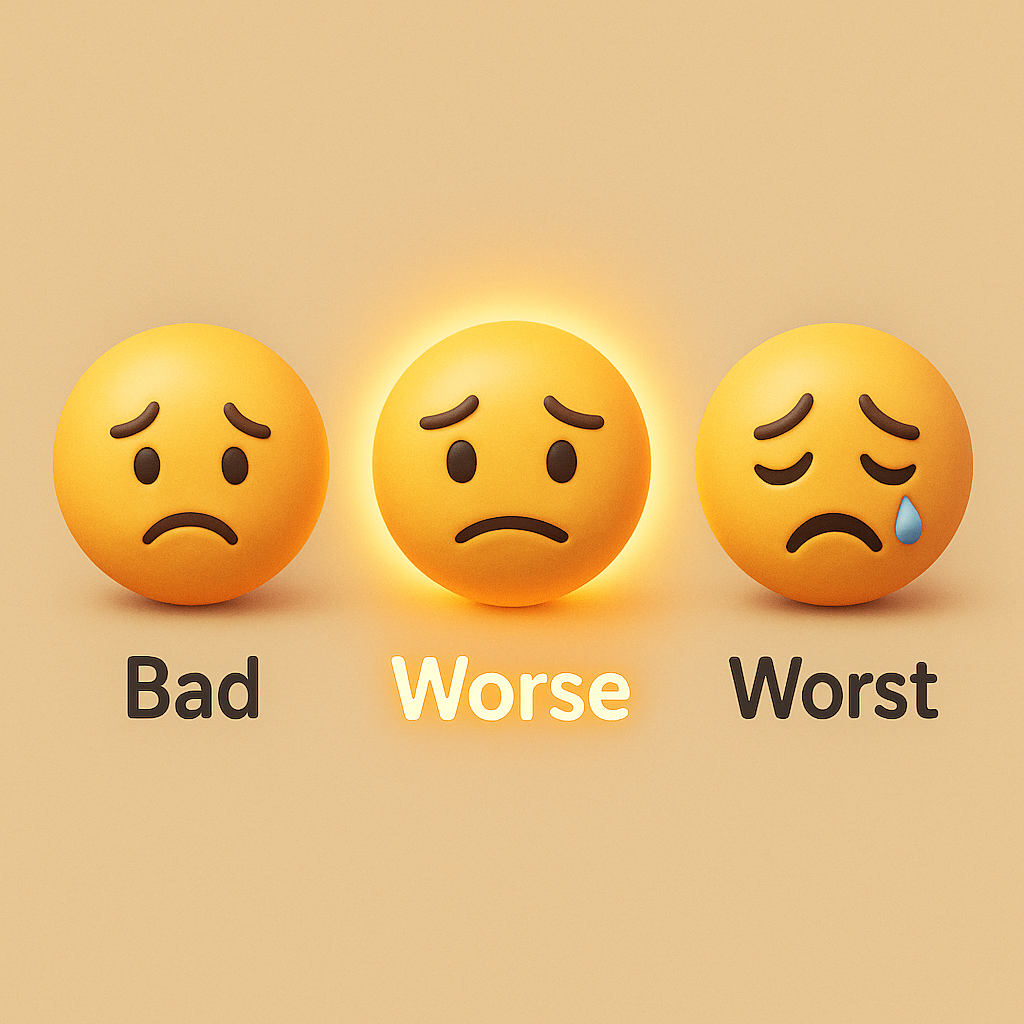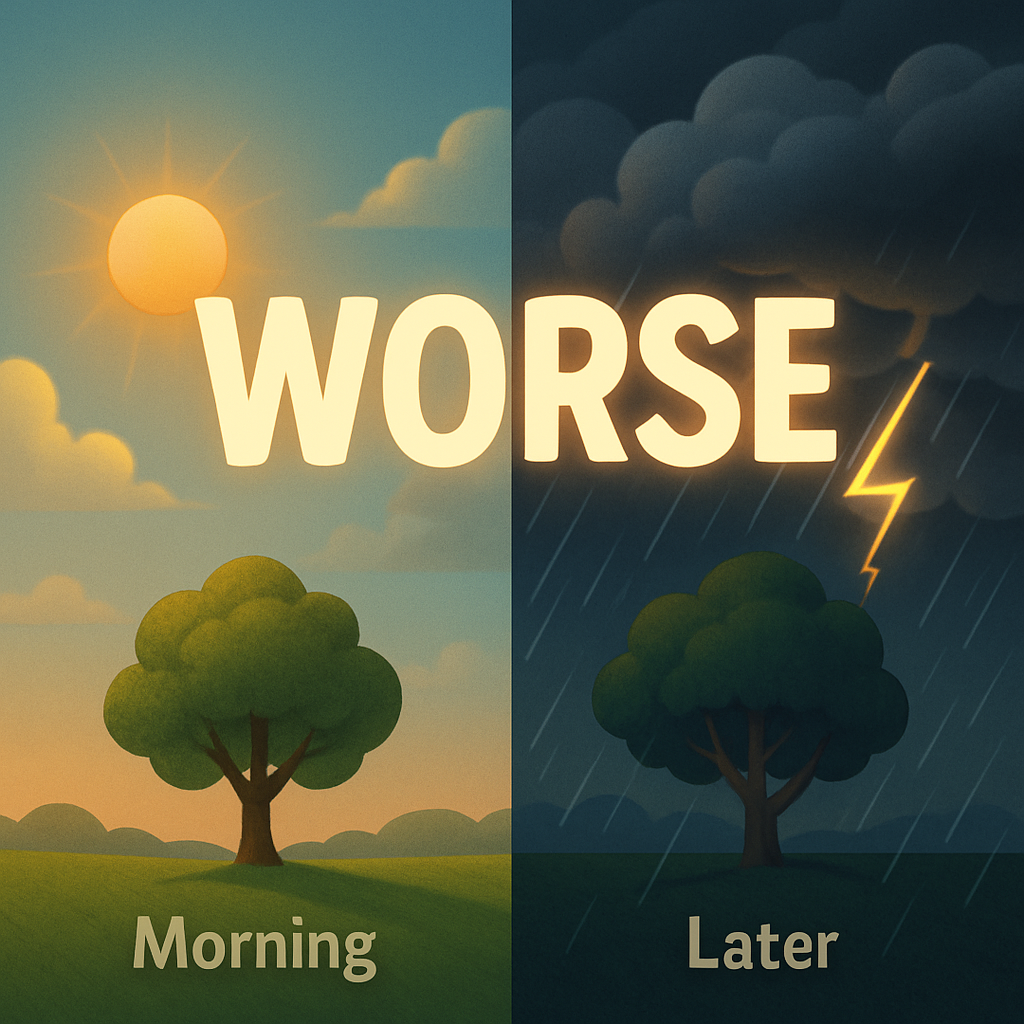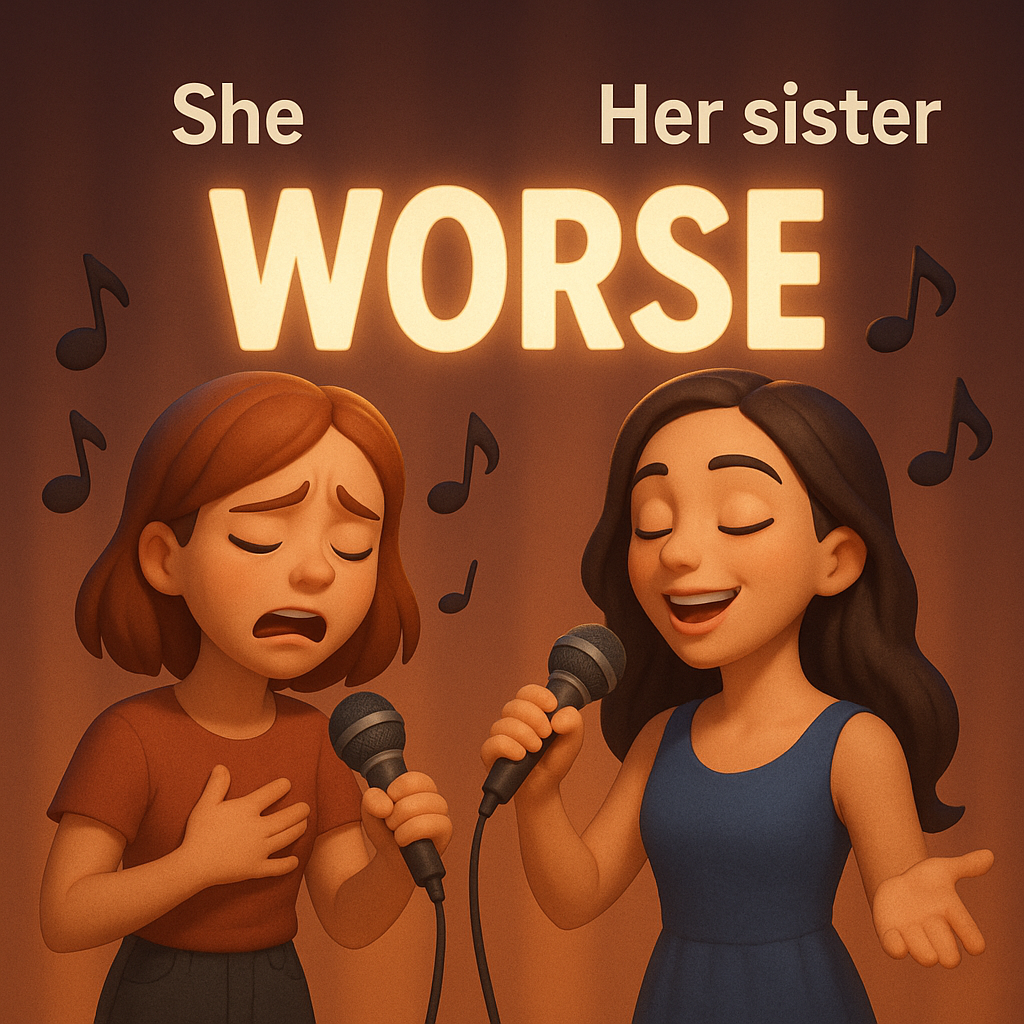Worse
Definition
Worse refers to a comparative term indicating a lower quality, standard, or condition compared to another. It can describe something less favorable or more severe.
Parts of Speech
- Adjective
- Adverb
- Noun
Pronunciation
American English
- IPA Pronunciation: /wɜrs/
- Respelling: WURSS
British English
- IPA Pronunciation: /wɜːs/
- Respelling: WURS
Etymology
The word "worse" originates from Old English "wyrsa," the comparative form of "yfel" (evil or bad), derived from Proto-Germanic "*wirsiz." It is related to Proto-Indo-European "*wers-," meaning "to confuse or mix up."
Derivatives
- Worsen (verb)
- Worsening (noun/verb)
- Worst (superlative)
- Unworsened (adjective)
- Worser (adjective, archaic)
Synonyms
- Poorer
- Inferior
- Harsher
Antonyms
- Better
- Improved
- Superior
Usage
The term "worse" is used to compare two states or situations, indicating a decline or less favorable condition. For example, "His health is worse today than yesterday." As a noun, it can describe an adverse event, such as "Prepare for the worse."
Related Terms
- Better: The comparative form indicating improvement or superiority.
- Worst: The superlative form indicating the least favorable condition.
- Decline: A decrease in quality or condition.
Detailed Definitions
Adjective
- Comparatively bad or unfavorable: Refers to being of lower quality or condition than another.
- Example: "This plan is worse than the previous one."
- More severe or intense: Describes a heightened negative condition.
- Example: "The weather became worse as the day went on."
Adverb
- To a greater extent in a bad way: Describes an increase in severity or negativity.
- Example: "She sings worse than her sister."
Noun
- An unfavorable or less desirable condition: Refers to a negative outcome or state.
- Example: "Expect the worse and prepare accordingly."
worse



🇨🇳 Mandarin Chinese
- 更糟 (Worse as bad)
- IPA: /kəŋ tsau/
- English Respell: gēng zāo
- 更坏 (Worse as bad)
- IPA: /kəŋ huai/
- English Respell: gēng huài
🇮🇳 Hindi
- खराब (Worse as bad)
- IPA: /kʰəraːb/
- English Respell: kharab
- बदतर (Worse as more bad)
- IPA: /bədˈt̪ər/
- English Respell: badtar
🇪🇸 Spanish
- Peor (Worse as bad)
- IPA: /pe.oɾ/
- English Respell: peor
- Más malo (Worse as more bad)
- IPA: /mas ˈmalo/
- English Respell: más malo
🇫🇷 French
- Pire (Worse as bad)
- IPA: /piʁ/
- English Respell: pire
- Moins bon (Worse as less good)
- IPA: /mwan bɔ̃/
- English Respell: moins bon
🇦🇪 Arabic (Modern Standard)
- أسوأ (Worse as bad)
- IPA: /ʔaswaʔ/
- English Respell: aswa'
- أقل (Worse as less)
- IPA: /ʔaqal/
- English Respell: aqal
🇧🇩 Bengali
- খারাপ (Worse as bad)
- IPA: /kʰarap/
- English Respell: kharap
- নিকৃষ্ট (Worse as inferior)
- IPA: /nikrist̪o/
- English Respell: nikrishto
🇷🇺 Russian
- Хуже (Worse as bad)
- IPA: /xuʐe/
- English Respell: khuje
- Более плохой (Worse as more bad)
- IPA: /bəˈlʲej ˈploxoj/
- English Respell: boleye plokhoj
🇵🇹 Portuguese
- Pior (Worse as bad)
- IPA: /piˈoɾ/
- English Respell: pior
- Menos bom (Worse as less good)
- IPA: /ˈmẽnuʃ ˈbõ/
- English Respell: menos bom
🇮🇩 Indonesian
- Lebih buruk (Worse as more bad)
- IPA: /ˈlə.biː buˈruk/
- English Respell: lebih buruk
- Tidak baik (Worse as not good)
- IPA: /tiˈdaʔ ˈbai̯k/
- English Respell: tidak baik
🇩🇪 German
- Schlechter (Worse as bad)
- IPA: /ʃlɛçtɐ/
- English Respell: schlechter
- Weniger gut (Worse as less good)
- IPA: /ˈvɛnɪɡɐ ɡuːt/
- English Respell: weniger gut
🇯🇵 Japanese
- 悪い (Worse as bad)
- IPA: /waru.i/
- English Respell: warui
- 劣る (Worse as inferior)
- IPA: /ote.ru/
- English Respell: oteru
🇻🇳 Vietnamese
- Tệ hơn (Worse as more bad)
- IPA: /tʲə˧ˀ˨ʔ hɔn˧ˀ˨ʔ/
- English Respell: tệ hơn
- Kém hơn (Worse as less good)
- IPA: /kɛm˧ˀ˨ʔ hɔn˧ˀ˨ʔ/
- English Respell: kém hơn
🇰🇷 Korean
- 나쁘다 (Worse as bad)
- IPA: /na.p͈ɯ.da/
- English Respell: nappeuda
- 더 나쁘다 (Worse as more bad)
- IPA: /tʰʌ na.p͈ɯ.da/
- English Respell: deo nappeuda
🇹🇷 Turkish
- Daha kötü (Worse as more bad)
- IPA: /daːˈha cøˈtyː/
- English Respell: daha kötü
- Kötü (Worse as bad)
- IPA: /cøˈtyː/
- English Respell: kötü
🇵🇰 Urdu
- بدتر (Worse as bad)
- IPA: /bədˈt̪ər/
- English Respell: badtar
- خراب (Worse as more bad)
- IPA: /xəˈraːb/
- English Respell: kharab





